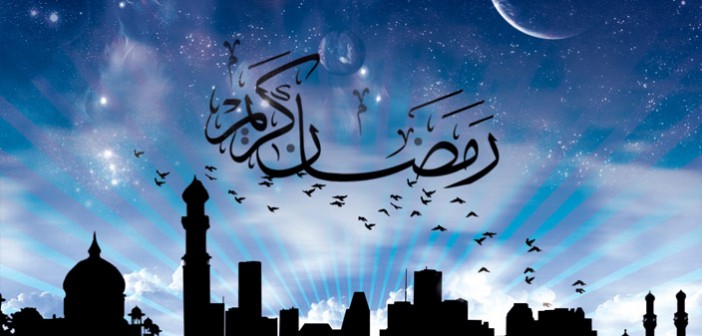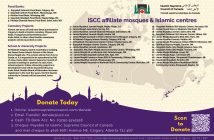Anniversary of Qur’an
O’ who believe, fasting is decreed for you as it was decreed for those before you; perchance you will guard yourselves. (2:183).
Ramadan is the month in which the Qur’an was sent down, a guidance for the people, and clear verses of guidance and criterion.(2:185)
Sowm (Fasting)
Abdullah Bin Ammar (May Allah be pleased with him) states that Allah’s Messenger (peace be upon him) said: “The fast and the Qur’an will both plead on behalf of the bondsmen who keeps fast in the day and recites or listens attentively to the recitation of the Qur’an at night standing in the presence of Allah (in Taraweeh). The fast will say “O my Lord, I had held him back from food, drink and sexual gratification, accept my intercession for him today and treat him with mercy and forgiveness. The Qur’an will say, ” I had held him back from taking rest and sleep at night, O MY lord, accept my intercession for him today and treat him with mercy and forgiveness”.
The intercession of both the fast and Qur’an will be accepted and he will be treated with exceptional kindness”. (Baihaqi). Samaan (May Allah be pleased with him.) reports: “On the last day of Sha`baan (8th month of Islamic calendar) the Messenger of Allah (peace be upon him) addressed us and said: “O people, there comes over you now a great month, a most blessed month in which lies a night more greater in virtue than one thousand months. It is a month in which Allah has made Sunnah the Taraweeh by night. Whosoever intends drawing
nearer to Allah by performing any virtuous deed, for him shall be the reward like him who had performed a Fardh in any other time. And whoever performs a Fardh, for him shall be the
reward of seventy Fardh in any other time. This is indeed the month of patience, and the reward for true patience is Jannah (paradise). It is the month of sympathy with one’s fellow men. It is the month wherein a true believer’s RIZQ (food, good deeds, etc.) is increased. Whosoever feeds another who fasted, in order to break the fast (at sunset), for him there shall be forgiveness for his sins and emancipation from the fire of Jahannam (hell), and for him shall be the same reward as him (whom he fed) without that person’s reward being decreased in the least.” The Night of Power (Lailatul Qadr) Anas Ammar (May Allah be pleased with him) reports that Rasulullah (Sallallaho Alaihi Wassallam) said: “On Laylatul Qadr, the Angel
Jibraeel (Alaihi Salaam) descends upon the earth
with a group of Angels
making Dua for blessings
for every servant of Allah whom they see in
worship, standing or sitting and engrossed in
almighty Allah’s praise. Then on the day of Eid
Allah boasts about them to the Angels, ‘O My
Angels, what is the reward of that worker who
had done his job very well?’ The reply: ‘O our
Sustainer, his reward should be given to him in
full.’ To this Allah replies, O’ My Angels, verily
My servants, the males among them as well as
females, have today duly performed their
obligatory duty, thereafter they set forth to place
for Eid Salaah raising their voices in Dua to Me. I
swear by My Honor, by My Grandeur, they fasted
for me and I will give them their reward.
Aisha (May Allah be pleased with her) reports
that Allah’s Messenger ((Peace be upon him) said
“Seek Lailatul Qadr among the odd numbered
nights of the last ten days of the month of
Ramadan”.
Requirements and Conditions of the
Duties Pertaining to Fasting Ramada
n
Moon Sighting
The efforts for sighting of the crescent moon
which defines the lunar months, is obligatory
upon the Muslim community or a delegated
organization of Muslim community. Once the
new moon has been sighted (i.e. the month’s
beginning has been determined), its “arrival”
should be proclaimed so that people may prepare
to carryout the activities of t
hat month on the
right date and time. For example; in Dhulhajjah to
perform Hajj and Eid, in Ramadan to start and
end fasting etc. If determination of the new moon
is impossible through sighting of the crescent, for
whatever reason, the Muslim community or on
their behalf the responsible organization (such as
Ru’yat-e-Hilal Co
mmittee) of that particular
geographical location can make decision based
upon the principles of Shari’a.
The important thing is that the Muslim
community should be united and should celebrate
the festival in togetherness at least in one
geographical location. What is required in
Ramadan and in Eid is wholehearted devotion to
Allah.
Intention
It is imperative during Ramadan to make the
intention to fast every night before the dawn of
the following day, otherwise the fast is void.
However, it is not the case with voluntary fasts.
When it is unclear whether or not the following
day is the first day of Ramadan one should make
the intention to fast in case it is. The possibility of
a trustworthy witness being mistaken should not
affect the intention of the person who plans to fast
the following day. If a woman anticipates the end
of her menstruation during which fasting is
prohibited before dawn, she should also
make the
intention to fast, the following day.
Conditions of the Daily Fast
It is obligatory upon every Musli
m after reaching
the age of puberty to fast each day of Ramadan
and not miss any fasting day intentionally. It is
obligatory to make up any days for which fasting
was missed unintentionally during Ramadan by
fasting at a later date whether or not they had a
valid excuse among which are menstruation,
pregnancy, nursing a baby, illness, travel and so
on. Fast days missed intentionally must be
expiated by fasting for two consecutive months.
Eating or drinking invalidates the fast as does
smoking, injections, enemas etc. Rinsing the
mouth with water does not invalidate the fast,
however, one must take care not to swallow or
inhale as one’s fast will become void. Care must
be exercised concerning eating just before the fast
is due to begin. One must also be careful not to
anticipate the arrival of evening and thereby break
the fast early. Married couples are forbidden to
have intercourse whilst they are fasting. However,
it is permissible after the fast has been broken in
the evening. In the event that one experiences a
“wet” dream whilst sleeping and then wake up the
following morning in this condition of impurity
his fast is not broken.
Deliberate seminal emission either through sexual
contact or through no sexual contact invalidates
the fast. The fast will not be broken by a kiss
unless seminal fluid is discharged, therefore, it is
discouraged. Induced vomiting invalidates the
fast. However, if one cannot help it, the fast
remains valid. Phlegm or mucus does not void the
fast unless it is “collected” in the mouth and then
swallowed.
In the event that one’s fasting becomes void, one
should continue the practice of those fasting – i.e.
abstinence of food and drink etc. However, if
sexual intercourse occurs during the fast of
Ramadan, its expiation will be to fast for two
consecutive months. If those who indulged in
intercourse are unable to fast the two consecutive
months then each should feed sixty poor people
as an expiation. In the case of a women whose
menstruation finishes during the day, there is no
obligation upon her to practice the fast for the rest
of that day.
Pregnancy & Nursing
If a woman is pregnant or breast feeding and
cannot fast on that account, fearing harm to her
own health or that of her child, it is obligatory for
her to fast the days that are missed later on, and
according to some scholar to atone for missing
the fast by feeding the poor with the equivalent of
a bushel of wheat for each lost day.
Sick an
d Elderly
In the case of elderly or ill people who are unable
to fast, their expiation is also the feeding of the
poor with the equivalent of a bushel of wheat for
each day lost.
Travel
The traveler is not obliged to fast provided travel
began before the time for the dawn prayer, the
travel entailing the distance considered a
condition for shortening the prayers. Missed fasts
of the traveler must be made up after the end of
Ramadan, but need not be expiated. In the event
that a person has already started fasting, he should
not break the fast when he embarks upon a
journey, nor yet when he returns from a journey.
There is no obligation upon a non-fasting traveler
to resume the fast upon reaching their destination
before the end of the fasting day, however it is
preferable for the traveler to fast the entire day
unless it incurs more than the usual hardship of
fasting. A person is considered a traveler when
he/she is planning to travel more than 57 miles.
Nowadays the traveling of 57 miles is daily
business for some people. Therefore, if one feels
comfortable to fast even he /she travels 57 miles
they can continue to fast.
Menstruation and Lochia
If a woman is menstruating or is bleeding due to
childbirth (lochia), fasting is not valid until the
menstruation ceases. Days missed by her can be
made up anytime after the end of Ramadan during
the year before the next Ramadan commences.
E’ tekaaf
The meaning of E’ tekaaf is to seclude oneself in
the Masjid (for male) and at a specific place at
home (for female) with the express intention of E’
tekaaf. It is mandatory to have at least one person
to do E’ tekaaf during Ramadan in a community.






